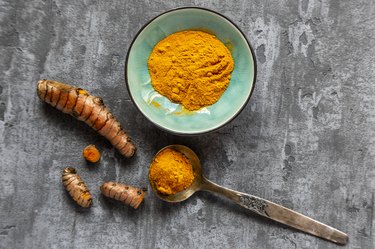
A staple in Indian cooking and medicine, turmeric is gaining popularity as a beneficial addition to the diet. Turmeric has been touted as helpful for conditions such as inflammation, pain, heart disease, high cholesterol and even cancer, but there are turmeric contraindications to be aware of.
While many of these claims need more research, the antioxidant and proven health properties of turmeric make it a wise addition to the diet. A July 2017 review in the Journal of Traditional and Complementary Medicine reports that the active ingredient in turmeric, called curcumin, has been shown to be competent in treating chronic conditions such as inflammatory bowel disease, rheumatoid arthritis and Alzheimer's disease.
Video of the Day
Video of the Day
Turmeric, as stated in the July 2017 report, may also help protect from cancers like lung, colon, skin cancers, stomach and breast. However, if you want to add turmeric supplements to your health regimen, it is important to be aware of possible turmeric contraindications.
Does Turmeric Affect Skin Conditions?
Although turmeric can be used to treat various skin conditions, it is also possible that taking high doses of the supplements can cause turmeric rash. In a study mentioned in the October 2017 issue of Foods, doses of 500 milligrams to 12,000 milligrams were reported to cause rashes in some subjects. Other symptoms reported included diarrhea, headache and yellow stool.
However, in the August 2016 edition of the journal Phytotherapy Research, psoriasis, eczema and pruritus conditions were all shown to improve with turmeric supplementation. Results were seen with both oral and topical cream applications of turmeric. This result is attributed to the curcumin present in turmeric and its anti-inflammatory, antimicrobial and antioxidant properties.
In another double-blind, placebo-controlled study in the April 2014 Journal of Nephrology, 100 patients with itchy skin saw benefits from taking turmeric supplements that the placebo group did not. A turmeric supplement of 500 milligrams three times per day was recommended. If you decide to treat a skin condition with turmeric, speak to your doctor, especially if the rash worsens.
What are the Turmeric Contraindications?
Although turmeric is considered safe and non-toxic in both oral and topical applications, there are studies that show a small number of people who can experience gastrointestinal issues as a result of turmeric supplementation. High dosage or long term use can cause stomach problems, according to The National Center for Complementary and Integrative Health. If you experience this issue, consult a doctor.
Medicines that have turmeric contraindications include anticoagulants, antiplatelets, non-steroidal anti-inflammatory drugs (NSAIDs) and selective serotonin reuptake inhibitors (SSRIs). If you take any drugs of these types or if you are unsure, talk to your doctor. These warnings only apply to the supplemental form of turmeric. Turmeric is safe to use in its natural whole food form in cooking or in skin preparations. The National Library of Medicine's Toxicology Data Network states no adverse effects are expected at doses of up to 8,000 milligrams per day.
Read More: Turmeric and Weight Loss
- Phytotherapy Research: "Effects of Turmeric (Curcuma longa) on Skin Health: A Systematic Review of the Clinical Evidence."
- Foods: "Curcumin: A Review of Its Effects on Human Health"
- Journal of Nephrology: "Effects of Turmeric on Uremic Pruritus In End Stage Renal Disease Patients: a Double-blind Randomized Clinical Trial."
- The National Center for Complementary and Integrative Health: "Turmeric"
- Medsafe: "Beware Turmeric/Curcumin Containing Products Can Interact with Warfarin"
- Journal of Traditional and Complementary Medicine: "Curcumin: An age-old anti-inflammatory and anti-neoplastic agent"